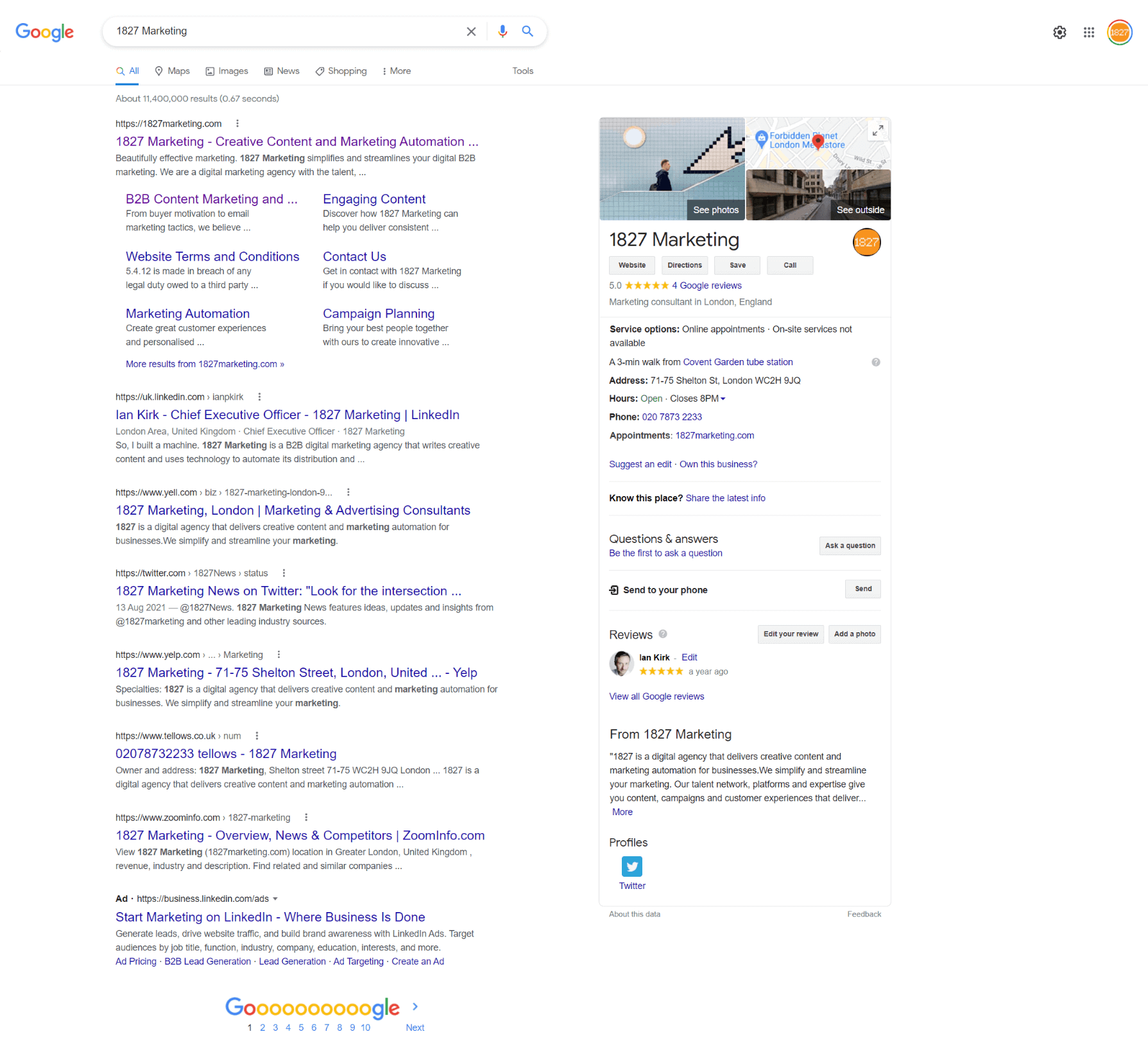How Local SEO Can Help Global B2B Marketing
Local SEO is obviously vital for small businesses with a bricks and mortar location. But is it a relevant B2B marketing strategy for professional services firms or businesses serving clients worldwide?
Unless you’re a purely digital entity the answer is most likely, yes. If you have a physical location, have face to face interactions with your customers, or sell services based on location, you could be missing out on valuable search traffic by neglecting local search optimisation.
What is local SEO?
Local search engine optimization (SEO) is a strategy businesses use to improve their online visibility. It aims to make sure you appear in the search engine results (SERPs) when buyers search for services like yours near them.
The location of a business matters to its customers as well as the search engines algorithms. While some B2B purchases are necessarily local, such as buildings maintenance, other non-location dependent purchases will be driven by a preference for suppliers to be close at hand.
Sign up for our newsletter
Get the latest news and ideas from 1827 Marketing sent directly to your in-box.
You will receive an email from us every couple of months, and you can opt out at any time.
Business customers often prefer to work with local companies. People like knowing they can contact a local office, even when dealing with global firms. Indeed, research from Kantar suggests that ‘localism’ is a growing trend driving engagement with brands across the globe.
A B2B customer with these buying priorities searches in the same way they would for a personal purchase. They might enter phrases like “digital marketing agency London” or “accountants near me”. However, people no longer need to type in the keywords “near me” or a location to get proximity based results. Search engines understand the intent of the query and determine if local results should be included.
While local results aren’t just based on proximity (relevance and prominence will also determine your position in the rankings), a business that has paid attention to local search improves its chance of ranking for a query with local search intent.
And those local searches come with a high buying intent. Just as someone searching for a ‘cafe near me’ probably wants to buy lunch in the near future; so a business searching for recruitment consultancies in their town is highly likely to have a job they need to advertise.
In short, your business could win more sales because of its proximity to the potential customer. They simply need to know you are there.
How to Boost Your Local SEO

Google search results showing a Map Pack on the right. Map Packs are created by Google when you add a local listing using Google My Business. It’s free, and a great way to improve both brand visibility and traffic.
Here are a few tactics that can help improve local rankings for a B2B business.
Business Listings
Create or claim ownership of business listings, and make sure they are optimised. The big one is Google My Business (GMB), but don’t put your eggs all in one basket. Bing Places, Yahoo business listings, review sites, and local business directories are all worth paying attention to.
Google My Business
Google My Business is a free business listing that is crucial for optimising for local search. When you set up your Google My Business profile, it gives you the opportunity to manage your presence on Google Search and Maps.
Claiming your listing gives your business the chance to improve its organic visibility. Once verified, your business can appear at the top of SERPs as part of the Google Map Pack, and as part of the local search results.
The information displayed includes your branding and photography, a description about your business and services, customer reviews and contact details.
It also displays call to action buttons directly in the results for a high intent audience. Make sure your listing includes correct information for your address, website and local telephone number. This way, potential customers can get directions to your door, be redirected to your website, or call with ease.
You should use both the primary and secondary business categories to tell Google what products and services your business offers. Likewise, you should make sure that your description and product or service information is optimised and uses keywords that your customers will be using in search.
If you have offices in several locations, it’s important to make sure each of your offices is listed in Google My Business. That way, potential customers who are looking for management consultants in London, Chicago, Sao Paulo or Berlin will still find your company rising to the top of search results if you have offices in the right cities.
Other Local Directory Listings
Local directories help your local customers to find your business. They also help Google get a better understanding of the prominence of your business and signal to how trustworthy your business information is.
The more links a business has to their website the more popular Google thinks they are. Therefore, local links from directories can be a great way to boost your authority and rank more highly, as well as getting more organic local traffic direct from the listing. Chamber of commerce,trade associations, yellow pages listings, and community pages are all great places to have your business listed.
However, you need to ensure that your business information is consistent and accurate across those listings so Google can be confident in sharing it. Your citations need to be correct and match across listings, which can be a nightmare to manage.
Listings management solutions, like SEMRush and Brightlocal, allow you to create and automatically update large amounts of local citations quickly and easily. You simply add your name, address, and phone (NAP) information and the system does the rest.
Trusted locations rank higher on Google. Google’s job is to give customers the most accurate information. If listings are outdated and Google is unsure of information it may decrease a business’s organic rankings.
Customer Reviews
Reviews matter. 87% of customers read online reviews before making a purchase decision and the search engines pay attention to them too.
Encouraging customers to leave reviews provides both your audience and the search engines with a source of social proof and the relevance and trustworthiness of your business.
Star ratings on Google My Business are placed on a site’s listing if the business has more than 7 reviews. This makes the business look more trustworthy in organic listings.
Reviews can also include keywords that Google can use to better understand your business. Responses give you a great opportunity to include useful local search and industry keywords in your answers. For example: “We are so glad you loved your [product/service] from [location], we look forward to working with you again.”
In addition, managing and answering reviews could also help to improve your standing with the search engine as it shows you are responsive to your customers.

Website Optimisation
Firstly, your website should include all of your up to date business information, including location(s) and telephone numbers. A great place to start is by making sure these geographic details are available in the footer so it is visible on every page of your site.
However, your optimisation efforts can’t stop there. Integrate city and regional information wherever possible. Make sure you have a dedicated contact page, featuring details of regional offices where relevant, and make sure all phone numbers are clickable on mobile. Include an interactive map of your location(s) as well.
You can also tweak your site’s content to ensure that local focused keywords show up on staff directories, case studies and testimonials, and in your content marketing .Don’t concentrate solely on the cities or towns where you have a presence. Think about all of locations your customers might use and weave them in.
Think about ways you can boost your local presence – for example, sponsoring local events or partnering with local businesses – and talk about it on your site. Feature companies you have worked with locally. This is a great opportunity for link building too.
In addition to your content, you need to pay attention to how your website is built. In particular, you need to make sure that it is optimised for mobile. Google places a high importance on mobile accessible websites and strongly recommends you optimise for it. Not only that, but your local customers are searching from their mobile devices too. 54.8% of all website traffic is viewed on a mobile, including 50% of B2B searches.
Paid Ads
Finally, while not strictly about local search, it never hurts to consider your options with paid promotions. Most paid advertising platforms will allow you to target your ads geographically to people searching local to your offices. If people want a local accountant, a city lawyer or London design agency, your paid advertising can complement SEO.
The number one reason to use paid ads for SEO is visibility .The more a business owns the search engine results page (SERP) the greater chance they have of getting the customer. If you can show up in the map pack, on a paid ad, and in an organic search, that gives you three separate results on the same search page. When 68% of buyers see an ad and research the provider further, increasing the exposure for your brand is a good way to improve contact rates.
In addition, paid ads also allow you to test a keyword quickly before investing the resources to create organic content. A business can test the click through rate of high value keywords and then focus on producing quality organic content for that keyword.
Final Thoughts
There is no doubt that a lot of B2B businesses can benefit from a local search focused strategy. Local search can enhance an overall SEO strategy. It gives a company more ownership of the SERP, improves selling power locally, and enhances brand recognition
1827 Marketing provides expert B2B marketing services and tools to help you reach your target audience. Plan campaigns and use our creative talent network to execute great local search campaigns.
We offer integrated marketing automation solutions, to save you time, track your results and maximise your marketing ROI. Get in touch to find out more.
Have a B2B marketing project in mind?
We might be just what you’re looking for






